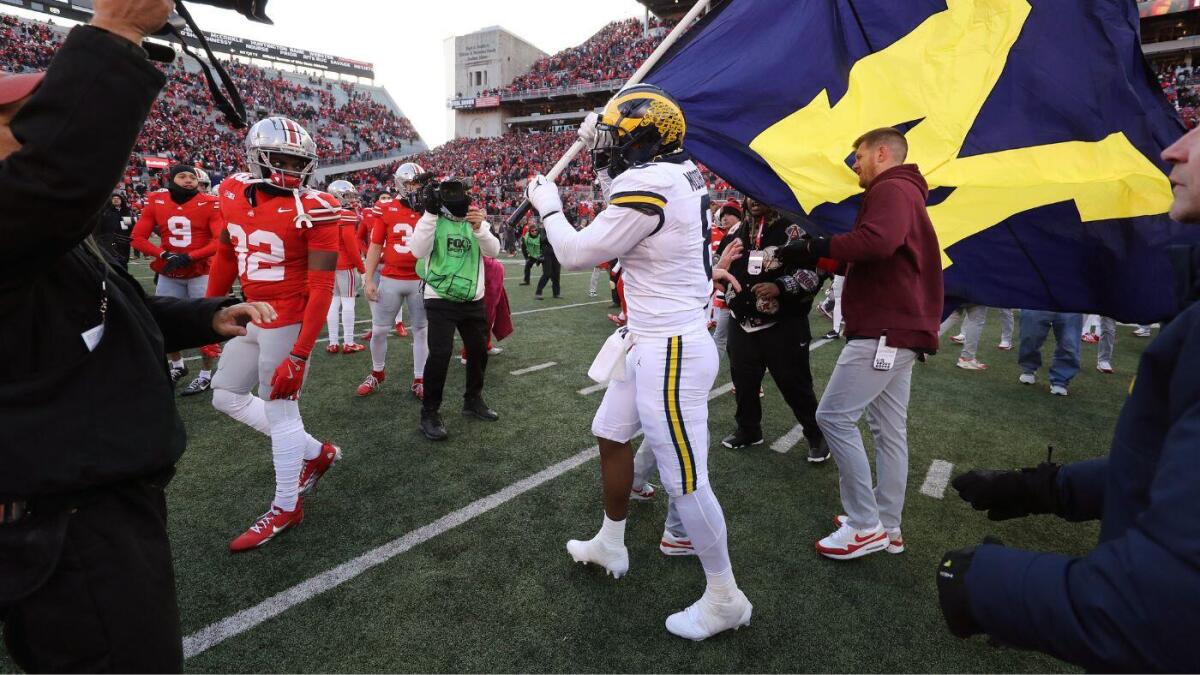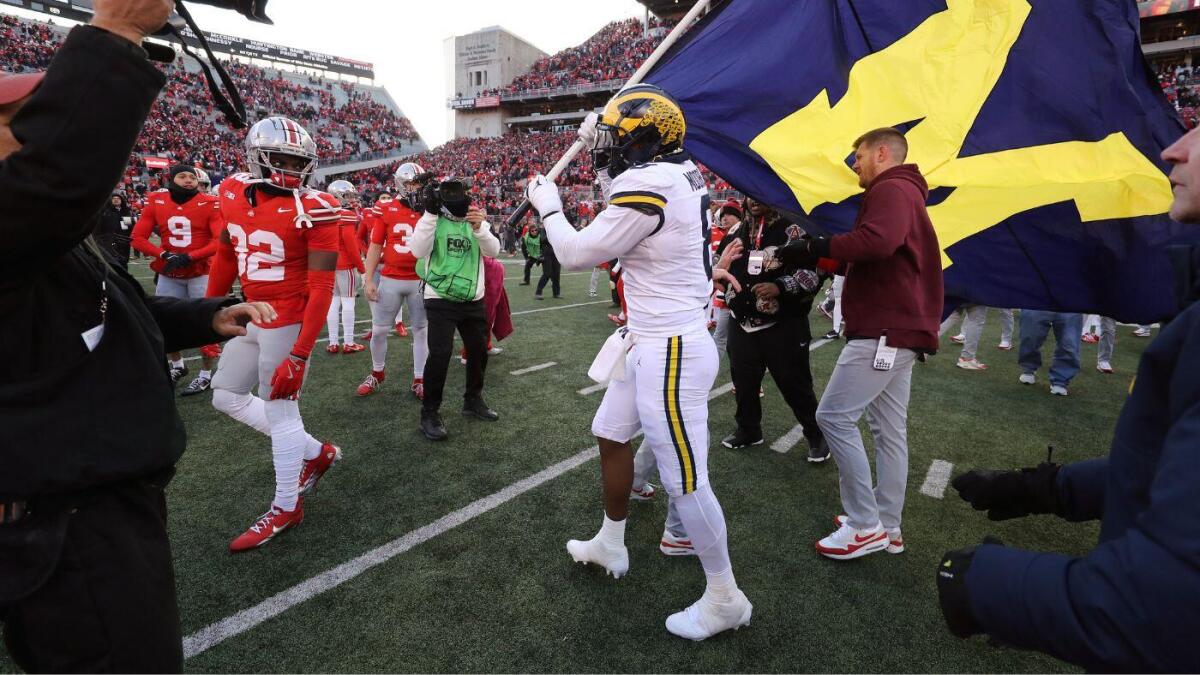The Murky Waters of Victory: Examining the Controversy Surrounding Ohio State’s 2024 National Championship
Introduction: The Rivalry That Defines a Generation
The Michigan-Ohio State rivalry is more than just a football game; it’s a cultural touchstone, a defining feature of the college football landscape. When Ohio State claimed the 2024 national championship, the celebrations in Columbus were as fierce as the backlash in Ann Arbor. The controversy ignited by Michigan defensive end Derrick Moore’s provocative statement, “It’s not a real win if y’all ain’t beat us,” has since dominated sports talk shows, social media debates, and watercooler conversations. This controversy isn’t just about one game or one season—it’s about the very essence of what makes a champion in the modern era of college football.
The Heart of the Matter: Moore’s Provocative Statement
Derrick Moore’s words were a direct challenge to the legitimacy of Ohio State’s championship. His argument wasn’t about the Buckeyes’ overall performance; it was about the perceived necessity of beating Michigan to claim true supremacy. This sentiment resonates deeply with fans and analysts who believe that a championship must be earned in the crucible of rivalry.
The Michigan-Ohio State game is more than just a conference matchup; it’s a cultural event. The stakes are higher, the emotions run deeper, and the implications extend far beyond the scoreboard. Moore’s statement reflects a belief that a national championship is incomplete without a victory over your most bitter rival. It’s a sentiment that echoes through the annals of sports history, where rivalries often define legacies.
Ohio State’s Perspective: A Championship is a Championship
From Ohio State’s vantage point, Moore’s comments are an affront to the hard work and dedication that went into winning the national title. The Buckeyes’ season was a testament to resilience, overcoming adversity and defeating every team in their path to the championship. To suggest that their victory is somehow “not real” because of a single loss to Michigan is, in their eyes, a disrespectful oversimplification of the sport.
The College Football Playoff system is designed to crown the best team in the nation through a series of high-stakes games. Ohio State’s journey to the championship was a testament to their skill, strategy, and mental toughness. The idea that a single loss to a rival should invalidate an entire season’s worth of achievements is a perspective that many Buckeye fans and players find frustrating and unfair.
Moreover, Ohio State’s argument hinges on the objective reality of winning a national title. The playoff system is designed to be a meritocracy, where the best teams rise to the top. To suggest that a championship is somehow tainted because of a loss to a rival ignores the broader context of the season. Every team faces setbacks, and the ability to overcome them is a hallmark of greatness.
The Rivalry Paradox: Love and Hate in Equal Measure
The Michigan-Ohio State rivalry is a study in contradictions. On one hand, there’s a deep-seated animosity, a desire to see the rival fail at all costs. On the other hand, there’s a grudging respect, an acknowledgment that the rival’s strength pushes your own team to greater heights. This paradox is at the heart of the controversy surrounding Ohio State’s 2024 championship.
Moore’s comments, while seemingly disparaging, also reflect a certain level of respect for Ohio State. He wouldn’t be so invested in questioning their title if he didn’t view them as a worthy adversary. The rivalry fuels the passion and intensity that make college football so compelling. It creates storylines, generates headlines, and ultimately elevates the game for everyone involved.
However, this intense rivalry can also lead to bitterness and resentment, particularly when one team perceives the other as having achieved success through questionable means or without truly earning it. Moore’s comments tap into this underlying tension, expressing a belief that Ohio State’s championship victory lacks the ultimate validation that only a win over Michigan can provide.
The Legacy Question: How Will History Remember Ohio State’s 2024 Season?
The ultimate question is how history will remember Ohio State’s 2024 season. Will it be celebrated as a triumphant achievement, a testament to the team’s skill and determination? Or will it be viewed with an asterisk, forever tainted by the loss to Michigan and the subsequent controversy?
The answer likely lies somewhere in between. Ohio State’s championship will undoubtedly be recognized in the record books, a permanent marker of their success. However, the loss to Michigan will also be a part of the narrative, a point of contention that fuels future rivalry matchups and shapes the perception of the season.
Ultimately, the legacy of Ohio State’s 2024 season will depend on the team’s future performance. If they continue to dominate and win championships, the loss to Michigan may fade into the background, a minor blemish on an otherwise stellar record. However, if the Buckeyes struggle in the years to come, the controversy surrounding the 2024 title may linger, a reminder of what could have been.
The Broader Implications: Championship Legitimacy in the Age of Playoff Expansion
The debate sparked by Moore’s comments also raises broader questions about championship legitimacy in college football. As the College Football Playoff expands, allowing more teams to compete for the national title, the importance of regular-season matchups, particularly rivalry games, may become even more pronounced.
With a larger playoff field, it’s possible that a team could win a national championship without having faced all of the other top contenders during the regular season. This could lead to further debates about the legitimacy of the title, with some arguing that a true champion must prove their dominance against a wider range of opponents.
The expansion of the playoff also places increased pressure on teams to perform consistently throughout the season. A single loss, even to a rival, could be the difference between making the playoff and being left out. This heightened stakes will likely intensify rivalries and make every game even more meaningful.
Conclusion: The Unending Cycle of Rivalry and Debate
Derrick Moore’s comments regarding Ohio State’s 2024 national championship perfectly illustrate the cyclical nature of rivalry and debate in college football. His words, regardless of their validity, have ensured that the Buckeyes’ victory will be forever viewed through the lens of their loss to Michigan. While Ohio State fans may dismiss Moore’s perspective, it highlights the deep-seated emotions and unwavering passion that define this iconic rivalry. The controversy surrounding the 2024 championship serves as a reminder that in the world of college football, victory is not always absolute, and the pursuit of perfection is often intertwined with the sting of defeat. The echoes of Moore’s challenge will undoubtedly resonate in the years to come, fueling the fire of this historic rivalry and ensuring that the debate over championship legitimacy continues to rage on.












